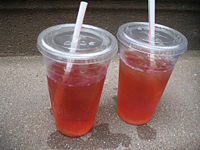
Plonk (wine)
Encyclopedia

British English
British English, or English , is the broad term used to distinguish the forms of the English language used in the United Kingdom from forms used elsewhere...
and Australian English
Australian English
Australian English is the name given to the group of dialects spoken in Australia that form a major variety of the English language....
for wine
Wine
Wine is an alcoholic beverage, made of fermented fruit juice, usually from grapes. The natural chemical balance of grapes lets them ferment without the addition of sugars, acids, enzymes, or other nutrients. Grape wine is produced by fermenting crushed grapes using various types of yeast. Yeast...
that is notably inexpensive or judged to be of poor quality. It is believed to come from Australian slang, in reference to blanc (the French
French language
French is a Romance language spoken as a first language in France, the Romandy region in Switzerland, Wallonia and Brussels in Belgium, Monaco, the regions of Quebec and Acadia in Canada, and by various communities elsewhere. Second-language speakers of French are distributed throughout many parts...
word for "white"), before it became naturalised in Britain. Stereotypical examples of plonk in the British context would include Blue Nun
Blue Nun
Blue Nun is a German wine brand launched by the company H. Sichel Söhne in 1923 with the 1921 vintage, and which between the 1950s and 1980s was probably the largest international wine brand. For most of its existence, Blue Nun was a single German wine, which until late 1990s was classified as a...
or Liebfraumilch
Liebfraumilch
Liebfraumilch or Liebfraunmilch is a style of semi-sweet white German wine which may be produced, mostly for export, in the regions Rheinhessen, Palatinate, Rheingau and Nahe. The name is a German word literally meaning "Beloved lady's milk"...
, both sweet German wine
German wine
German wine is primarily produced in the west of Germany, along the river Rhine and its tributaries, with the oldest plantations going back to the Roman era. Approximately 60 percent of the German wine production is situated in the federal state of Rhineland-Palatinate, where 6 of the 13 regions ...
s, although Spanish wine
Spanish wine
Spanish wines are wines produced in the southwestern European country of Spain. Located on the Iberian Peninsula, Spain has over 2.9 million acres planted—making it the most widely planted wine producing nation but it is the third largest producer of wine in the world, the largest...
is often also a target. Despite the reference to the colour white, the term is not limited to white wine, and can as easily indicate a red wine or rosé
Rosé
A rosé is a type of wine that has some of the color typical of a red wine, but only enough to turn it pink. The pink color can range from a pale orange to a vivid near-purple, depending on the grapes and wine making techniques.- Production techniques :There are three major ways to produce rosé...
. In this context, the phrase has even spawned the title of a novel which evokes the perceived tackiness of the 1980s.
Plonk that is packaged & sold in a cask
Box wine
A box wine is a wine packaged as a Bag-In-Box. Such packages contain a plastic bladder protected by a box, usually made of corrugated fiberboard.- History :...
, is referred to as Goon.
Other usages
The term is not always used in a wholly derogatory manner. It can indicate a degree of strange affection for the wine in question. TelegraphThe Daily Telegraph
The Daily Telegraph is a daily morning broadsheet newspaper distributed throughout the United Kingdom and internationally. The newspaper was founded by Arthur B...
journalist Max Davidson has equated plonk with "youth, ... excess, ... self-indulgence in times of penury. Forget grown-up wine. With plonk, the sweetest bouquet of all is the taste of a few pence saved."
Today, the term can often be used to indicate that a particular social gathering is not a fancy affair. For example, if a party guest is worried about the social level of the occasion, a host might assuage his or her concerns with the phrase: "Oh, just bring a bottle of plonk." Indeed, probably the most famous literary use of "plonk" comes in Willy Russell's play Educating Rita
Educating Rita
Educating Rita is a stage comedy by British playwright Willy Russell. It is a play for two actors set entirely in the office of an Open University lecturer....
. Working-class
Working class
Working class is a term used in the social sciences and in ordinary conversation to describe those employed in lower tier jobs , often extending to those in unemployment or otherwise possessing below-average incomes...
Rita decides she cannot attend a party to which academic Frank has invited her, since she is ashamed of the wine she has bought and feels out-of-place. When Rita reports her anxieties to Frank the following week, he castigates Rita for being overly self-conscious, reassuring her: "It wouldn't have mattered if you'd walked in carrying a bottle of Spanish plonk."

